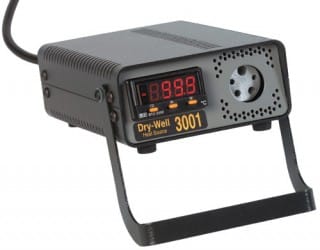Downloads
3000 Series Drywell Calibrator
Description
Drywell calibrators play a critical role in ensuring the accuracy and reliability of temperature measurements across various industries and applications. They provide a stable and controlled temperature environment, enabling precise calibration of temperature sensors, leading to improved product quality, enhanced safety, and increased efficiency.
The 3001 dry well calibrator has a high level of stability (±0.5°C) and a stabilisation time of five minutes. Plug it in, switch it on, set the verification temperature with the front panel buttons and insert your probe into the correct size well. Compare the temperature reading of your thermometer to the display and the difference is the error.
The 3001 will accept probe diameter sizes, Ø 3.3, 4, 4.76 and 6.35mm.
The 3002 will accept probe diameter sizes, Ø 3.3, 4.76, 6.35 and 9.6mm.
The 3003 will accept probe diameter sizes, Ø 4.76 and 12.7mm.
|
|||||||||||||||||||||
Drywell Calibrator Primary Purposes:
1. Accurate Temperature Calibration:
- Establishing a Stable Temperature Reference: Drywell calibrators create a highly stable and uniform temperature environment to test temperature probes. The well acts as a reference temperature source for calibrating various diameter of temperature sensors.
- Ensuring Measurement Accuracy: By comparing the readings of the sensor under test to the known temperature of the dry-well, technicians can determine the accuracy of the sensor and identify any deviations.
2. Versatility in Calibration:
- Wide Range of Sensors: Drywell calibrators can accommodate a variety of temperature sensors, including thermocouples, RTDs (PT100’s), and thermistors.
- Different Temperature Ranges: The 3000 Series can be set for any temperature from 33 to 300°C in 0.1°C increments.
3. Portability and Convenience:
- Compact and Portable: The 3000 Series Drywell calibrators are designed to be portable, making them suitable for on-site calibrations in industrial settings or field environments.
- Ease of Use: User-friendly interfaces and intuitive controls simplify the calibration process.
4. Key Applications:
- Industrial Processes: Calibration of temperature sensors used in manufacturing, food processing, pharmaceuticals, and other industries where accurate temperature control is crucial.
- Research and Development: Ensuring the accuracy of temperature measurements in scientific research and laboratory settings.
- Quality Control: Maintaining the quality of products and processes by ensuring accurate temperature readings throughout the production chain.
- Maintenance and Troubleshooting: Identifying and resolving issues with temperature measurement systems to prevent costly downtime and ensure safety.

